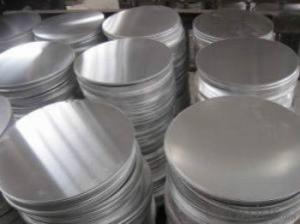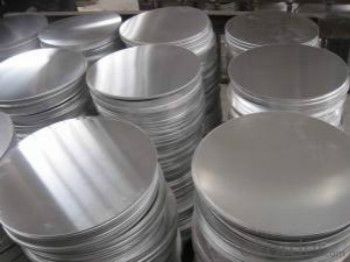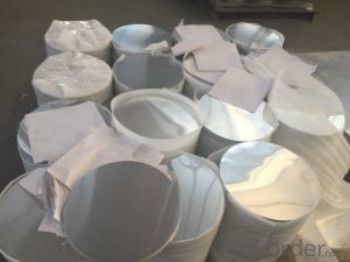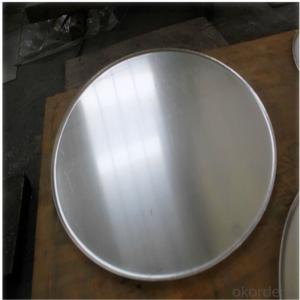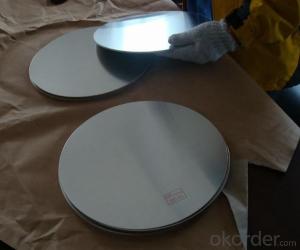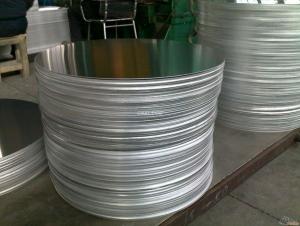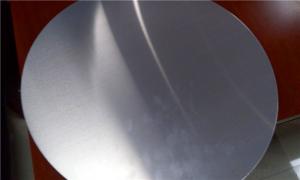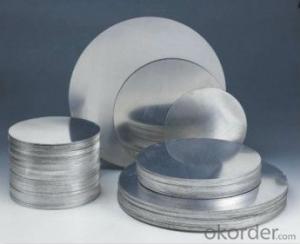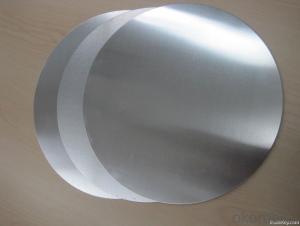1060 Aluminum Coil Price for Deep Drawing Aluminum Circle for Utensils
- Loading Port:
- Shanghai
- Payment Terms:
- TT OR LC
- Min Order Qty:
- 5 m.t.
- Supply Capability:
- 2000 m.t./month
OKorder Service Pledge
OKorder Financial Service
You Might Also Like
Specification
1. Structure of DC Aluminium in Coil Form for making Aluminium Circle Description
DC Aluminium in Coil Form for making Aluminium Circle is one semi-finished aluminium material. This coil can be rolled down to aluminium coil,sheet,circle ect. The alloy AA1050 is widly used in building, industry ect. Its weight is much lower than steel. So many customers choosed aluminium material instead of steel.
2. Feature of DC Aluminium in Coil Form for making Aluminium Circle
Surfact Quality :
Be free from Oil Stain, Dent, Inclusion, Scratches, Stain, Oxide Dicoloration, Breaks, Corrosion, Roll Marks, Dirt Streaks and other defect which will interfere with use,
Mechenical Property:
Chemical Composite and Mechanical Property
3. Image of DC Aluminium in Coil Form for making Aluminium Circle
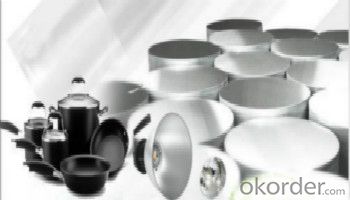
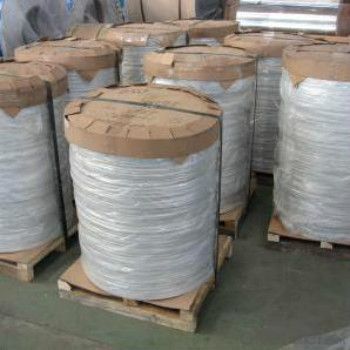
4. Specification of DC Aluminium in Coil Form for making Aluminium Circle
Aluminum Coil/Sheet | |
Main Specification | |
Alloy | AA1xxx (AA1050, AA1060, AA1070, AA1100 etc.) |
AA3xxx (AA3003, AA3004, AA3005, AA3105 etc.) | |
AA5xxx, AA6XXX (AA5052,AA5083, AA5754, AA6061, AA6062 etc.) | |
AA8xxx(AA8011, AA8006 etc.) | |
Temper | H14,H16, H18, H22, H24, H26, H32,O/F, T4, T6, T651 |
Thickmess | 0.01mm-100mm |
Width | 30mm-1700mm |
Standard | GB/T 3880-2006/ASTM |
Special specification is available on customer's requirement | |
5. FAQ
1) What is the delivery time?
Depends on actual order, around 20 to 35 days
2) What is the QC system:
We have QC staff of 20 persons and advanced equipment, each production is with MTC traced from Aluminum ingot lot.
3) What market do you mainly sell to?
Australia, America, Asia, Middle East, Western Europe, Africa etc
4)What about payment term?
30% T/T in advance, balance against B/L COPY or 100% L/C AT SIGHT.
- Q: What are the common sizes of aluminum coils?
- The specific industry and application determine the varying common sizes of aluminum coils. However, different industries commonly utilize certain standard sizes. In the construction field, aluminum coils typically have a thickness ranging from 0.018 inches to 0.032 inches and can be as wide as 60 inches. These coils find their purpose in roofing, siding, and gutter applications. In the automotive sector, aluminum coils are frequently employed in the production of body panels and structural components. The sizes of these coils can greatly differ, varying from thin strips for small parts to larger coils with widths of up to 72 inches for bigger components. The packaging industry utilizes aluminum coils to manufacture foil products, including food packaging and industrial packaging. The thickness of these coils can range between 0.00017 inches and 0.0005 inches, while the widths commonly fall between 12 inches and 24 inches. It is important to acknowledge that these examples represent only a selection of common sizes, and specific applications may necessitate customized aluminum coil sizes. Furthermore, manufacturers possess the capability to produce coils in various dimensions to meet the specific requirements of their customers.
- Q: I own a pistol with an aluminum frame. If I were to store it away for a long time, would I need to bother wiping oil over the aluminum surfaces in addition to the steel surfaces? If it helps, there is a dark grey sort of finish on the aluminum.
- It matters! All metal corrodes! I don't care what others say because they don't know. Wipe down your gun good and put a good heavy oil or Break free CLP on them and place them in a good sock protector or sealed case in a cool climate controlled dry place with some moisture packs inside.
- Q: How do aluminum coils perform under high-temperature applications?
- Aluminum coils are known for their excellent heat resistance and performance in high-temperature applications. Due to their low melting point of around 660 degrees Celsius (1220 degrees Fahrenheit), aluminum coils can withstand and operate efficiently under elevated temperatures. Aluminum has a high thermal conductivity, meaning it can quickly transfer heat away from the coil, preventing overheating and potential damage. This property allows aluminum coils to effectively dissipate heat, resulting in improved thermal management and enhanced performance in high-temperature environments. Moreover, aluminum coils exhibit good corrosion resistance, which is crucial in applications where heat and moisture are present. The oxide layer that naturally forms on the surface of aluminum provides a protective barrier against corrosion, ensuring the longevity and reliability of the coil even in challenging conditions. Furthermore, aluminum coils are lightweight and possess excellent formability, allowing for easy installation and integration into various systems and applications. This versatility makes them suitable for a wide range of high-temperature applications, including heat exchangers, automotive components, HVAC systems, and electrical devices. However, it is important to note that extreme temperatures beyond the melting point of aluminum can cause the material to weaken or deform. Therefore, it is essential to consider the specific temperature requirements and limitations of the aluminum coil before implementing it in a high-temperature application.
- Q: Can aluminum coils be used in chemical processing plants?
- Indeed, chemical processing plants can utilize aluminum coils. Aluminum, a versatile and extensively employed substance across multiple industries, including chemical processing, boasts exceptional resistance to corrosion. Consequently, it proves apt for the manipulation and conveyance of diverse chemicals. The application of aluminum coils extends to heat exchangers, condensers, evaporators, and other chemical processing equipment. Moreover, aluminum coils boast a lightweight nature and exhibit high thermal conductivity, promoting efficient heat transfer and energy conservation. Nevertheless, it remains crucial to carefully evaluate the specific demands and compatibility of the chemicals being processed to ascertain the suitability of aluminum coils for the intended use.
- Q: Are aluminum coils suitable for heat exchangers?
- Aluminum coils are indeed a fitting choice for heat exchangers. This is because aluminum possesses exceptional thermal conductivity, making it highly efficient and effective in transferring heat between mediums. Its ability to swiftly transfer heat from one medium to another is particularly advantageous for heat exchangers that require efficient heat transfer. Furthermore, aluminum coils are lightweight, resistant to corrosion, and boast excellent durability. These qualities contribute to their popularity in a wide range of applications, including heat exchangers. The corrosion resistance of aluminum ensures that the coils can endure harsh environments and prevent the occurrence of rust or corrosion, thereby prolonging the heat exchanger's lifespan. Moreover, aluminum coils are easily moldable and can be shaped into various forms, allowing for flexibility in designing and constructing heat exchangers. This adaptability makes them suitable for a diverse array of applications, such as HVAC systems, refrigeration units, and automotive cooling systems. In conclusion, the high thermal conductivity, lightweight nature, corrosion resistance, durability, and versatility of aluminum coils make them well-suited for heat exchangers. These properties establish aluminum coils as an excellent choice for achieving efficient heat transfer in numerous industries.
- Q: This question asks for a comparison between single-coil and multi-coil aluminum tubes, highlighting their differences.
- <p>Single-coil aluminum tubes are made with a single layer of aluminum wound into a cylindrical shape, offering simplicity and ease of manufacturing. They are typically used in applications requiring basic heat exchange or formwork. In contrast, multi-coil aluminum tubes consist of multiple layers of aluminum wound together, which can provide greater strength and durability. They are often utilized in more demanding applications where higher pressure resistance and thermal efficiency are required, such as in high-performance heat exchangers or industrial processes. The multi-coil design also allows for better heat distribution and can handle more stress without deformation.</p>
- Q: Can aluminum coils be recycled multiple times?
- Aluminum coils possess the remarkable ability to be recycled numerous times. This is due to the fact that aluminum is an exceptionally recyclable substance, and its quality remains unaltered throughout the recycling process. As a result, aluminum coils can be melted and reshaped into fresh coils on multiple occasions, without experiencing any deterioration in their performance or characteristics. The act of recycling aluminum not only aids in the preservation of natural resources, but it also conserves a significant amount of energy compared to the production of new aluminum using raw materials. Consequently, opting for aluminum coils is a sustainable and eco-friendly decision, as they can be recycled multiple times.
- Q: Can aluminum coils be used in the production of architectural panels?
- Yes, aluminum coils can be used in the production of architectural panels. Aluminum is a popular material for architectural panels due to its lightweight, durability, and versatility. Aluminum coils can be easily shaped, cut, and formed into various panel designs, making them suitable for a wide range of architectural applications.
- Q: Can kerosene lubricate and cool aluminum coil when continuous punch?
- Yes, because water and oil are not solute, but they will emulsificate.
- Q: Are aluminum coils resistant to saltwater corrosion?
- Generally, aluminum coils exhibit resistance to corrosion caused by saltwater. Aluminum is widely recognized for its exceptional corrosion resistance, particularly in marine settings where exposure to saltwater is common. The naturally occurring oxide layer on the surface of aluminum acts as a shield, effectively preventing direct contact between the aluminum and the corrosive saltwater. This oxide layer serves as a protective barrier against saltwater corrosion. Moreover, various coating techniques, such as anodizing or painting, can be employed to further enhance the resistance of aluminum coils against saltwater corrosion. Nevertheless, it is worth noting that prolonged or continuous exposure to saltwater can gradually deteriorate the protective oxide layer and potentially result in corrosion, albeit at a slow pace. To prolong the lifespan and optimize the performance of aluminum coils in saltwater environments, regular maintenance and appropriate care are essential.
Send your message to us
1060 Aluminum Coil Price for Deep Drawing Aluminum Circle for Utensils
- Loading Port:
- Shanghai
- Payment Terms:
- TT OR LC
- Min Order Qty:
- 5 m.t.
- Supply Capability:
- 2000 m.t./month
OKorder Service Pledge
OKorder Financial Service
Similar products
Hot products
Hot Searches
Related keywords
